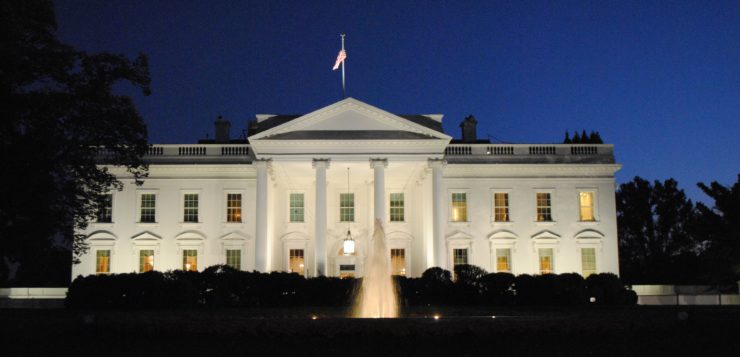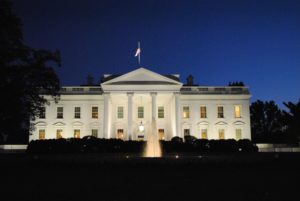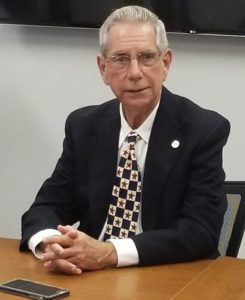In April 1976 I attended a speech by President Gerald Ford, which I found wanting. That night, I wrote a critique of the speech and sent it to the White House. I thought nothing of it until a week later, when I received a call from the White House asking if I would like to interview for a recently vacated spot on the speechwriting staff. Since the semester was about to end, I believed
it might be interesting to take on the assignment for the summer. At that point, Ford was trailing Jimmy Carter in the polls and had in fact not even secured his own nomination. The chances of his winning the presidential election were slim to none. I passed the interview and the security clearance. When asked if I had done anything that would embarrass the president, I could honestly answer, “No.” While I was in the closet, as a good Catholic, I was also celibate. I suddenly found myself in a small office in the old Executive Office Building across the alley from the White House in a job that would change my life forever.
My first assignment as a full-time writer was something of a hazing. Counselor to the President Robert Hartman called on me to write President Ford’s impending speech to the Southern Baptist Convention meeting in Norfolk, Virginia. It would be a tough crowd, since they loved Jimmy Carter, a born-again Christian. Furthermore, a Catholic, closeted gay man would be writing for an Episcopal president speaking to a conservative Baptist audience. It was enough to make your head swim.
I did my due diligence, speaking first with the President about what he wanted to say and how he wanted to say it. Then I met with a Baptist minister to get a fix on the audience. After six drafts, I believed the speech was ready. The president and his staff were thrilled when applause interrupted the speech thirteen times, and the Washington Star praised the speech the next
morning. I could relax a bit now that I was established as a successful writer. As we moved toward the Bicentennial of the Declaration of Independence, the president decided to commission six interlocking speeches that would eventually be published in book form. The president hoped the speeches would provide a boost to his sagging poll numbers.
Along with close friends of the president, the five presidential speechwriters were asked to submit a blinded six-page outline, one page for each speech. The author of the selected outline would oversee the writing of the six speeches celebrating the Bicentennial. My outline was selected along with one from another writer. We decided to assign two writers to each speech and then blend the best passages of each draft into a final speech suited to the audience and occasion. I drafted the President’s speeches at Valley Forge and Monticello.
By the end of the Bicentennial celebrations, the president had closed the gap in the polls to ten percentage points. A few weeks later, at the Democratic Convention, Carter gave an adequate address, but it was very light on specifics. I surmised that Carter was trying to keep various groups inside the Democrats’ big tent. For example, labor and Jewish groups generally hated affirmative action, but it was embraced by minorities, so Carter avoided the subject altogether. While he condemned inflation, he offered no cure.
Then it was on to the Republican Convention in Kansas City. After disposing of Reagan’s challenge to the nomination, Ford came forward to give his well-rehearsed acceptance speech. At the outset, he challenged Carter to three debates, the first since 1960, and then focused on specifics. The polls after the Republican Convention had Ford just five percentage points behind Carter, easily within striking distance. The debates would prove crucial to the election’s outcome.
The media helped set the expectations for the debate. Carter was portrayed as a bright nuclear engineer out of the Naval Academy with a solid record as governor of Georgia. Ford was portrayed as the unelected vice president who had pardoned Nixon and mangled the English language. The fact that Ford graduated in the top third of his Yale Law class while coaching the Yale football team was ignored. Worse, on Saturday Night Live, Chevy Chase was ridiculing the president’s awkwardness. A tall man, Ford often bumped his head on door jambs and once stumbled on the stairs when exiting a plane.
As a former debater and debate coach, I advised Ford on how to proceed. He was up to the task. His answers were crisp, specific, and informed. He ignored Carter and spoke directly into the camera, a tactic that had served John Kennedy so well in his first debate with Nixon. Ford exceeded expectations. When the next round of polls came out, the race was dead even. The second debate would end our euphoria. When Max Frankel of the New York Times asked Ford to defend his policy of détente, Ford answered that Yugoslavia remained free of Soviet domination, that Romania was moving in that direction, and that the Soviets did not “dominate Poland.” Ford breathed a sigh of relief. But Frankel had a follow up: Did you just say that the Soviets did not dominate Poland? Yes, Ford responded.
Immediately after the debate, political advisor Stu Spencer urged the president to hold a news conference and say that he had misspoken. He meant to say that the Soviets did not dominate the “hearts and minds of the Polish people.” Henry Kissinger intervened and argued that Ford would only make matters worse by correcting himself. Kissinger was trying to get Anatoly Sharansky out of the Soviet Union, so the less said the better. The staff debated the issue over the next five days, while Ford was roasted in the press. He finally issued the correction in California five days later. It was too late. The bumbling image of Ford had returned, and the election slipped away.
I left the White House to become the founding chair of the Communication Division at the University of Alabama at Birmingham. A year later, Ford came to the city to speak, and I had a chance to renew our friendship. A few months later, I was recruited to be the campaign speechwriter for George H.W. Bush. I would continue through 1992. But in 1979, I cooled a bout of Potomac fever by becoming the Director of Senate Services for the Republican Caucus of the U.S. Senate. In 1980, I managed Senator Packwood’s re-election campaign. In 1981, I became Deputy Director of the National Republican Senatorial Campaign Committee, all the while in the closet. In 1983 I became president of the Freedom of Expression Foundation, which I moved to California State University, Long beach, in 1988 to begin a 27-year tenure. When my father, a war hero, died in 1996, I finally came out as gay. While unforgivably late, it was the most important thing I ever did in my life.
Dr. Craig R. Smith is the author of 23 books, including his autobiography, Confessions of a Presidential Speechwriter, which covers his time as a speechwriter for President Gerald Ford, George H. W. Bush, and Governor Pete Wilson. He has won the Ehninger Award for contributions to rhetorical theory and the Gronbeck Award for political communication, both from the National Communication Association. He became a full professor at California State University, Long Beach until he retired in 2015.








